14th September 2023
The Spokesmen Cycling Podcast
EPISODE 339: Balance bikes, Bikeability and the Saint Piran team at the Tour of Britain
SPONSOR: Tern Bicycles
HOST: Carlton Reid
GUEST: Ricci Pascoe
TOPICS: From mail order innovator to net zero hero: farmer’s son Ricci Pascoe founded Bike Chain of Cornwall in 1985 and created the UCI Continental team Saint Piran in 2016. It’s been quite the journey.
TRANSCRIPT
Carlton Reid 0:13
Welcome to Episode 339 of the Spokesmen cycling podcast. This show is engineered on Thursday 14th of September 2023.
David Bernstein 0:28
The Spokesmen cycling roundtable podcast is brought to you by Tern Bicycles. The good people at Tern are committed to building bikes that are useful enough to ride every day and dependable enough to carry the people you love. In other words, they make the kind of bikes that they want to ride. Tern has e bikes for every type of rider. Whether you’re commuting, taking your kids to school or even carrying another adult, visit www.ternbicycles.com That’s t e r n bicycles.com to learn more.
Carlton Reid 1:04
On today’s show, I talk with bike industry veteran Ricci Pascoe. We talked about the St Piran racing team he founded and which had such an amazing Tour of Britain last week with a young rider I’ve known since he was a very young rider, finishing high on general classification, just a few places behind famous World Tour professionals. We also talked about mental health, aiming for net zero and getting more people on bikes. I recorded Ricci remotely; he was talking from his bike shop’s cafe
Ricci Pascoe 1:44
Over the years, a bit of a fan. I liked what you produced like this mega I’ve been involved in the industry for 35 years I mean you’ll you’ll remember me probably is Ricci limited mail order maybe back in the day you know that type of thing.
Carlton Reid 2:00
I was actually going to start there because yes, I absolutely remember that because you were doing mail order long before you know in ads in the comic and Cycling weekly and long before there was internet ordering.
Ricci Pascoe 2:16
Oh, mate there was there was five of us that probably carved up the UK market Jack Parker, Ribblethey started Who else was there Oh Mel Bentley you know that type of thing.
Carlton Reid 2:27
So why so that was that was via that was via Ricci limited or was that via Bike Chain was that
Ricci Pascoe 2:32
Ricci Limited was always the mailorder side and then obviously we morphed or people couldn’t remember. Bike Chain was kind of the local name that are you horrible is just people could use yeah maybe understand bytecode well, but in fact up to the will not come a franchise in the UK I don’t know here writing Do you remember called Townsend limited? Oh yeah. Yeah, what was all its concept that there was a director there Steve Walsh been riding the CPU years we’ve been set up I remember it very well actually was in the 80s So I said look, if you’re going to multistore site in the 80s got it by chain if you do the data for the year in terms of the layout one thing that other members were doing several million turnover back then. And you could have bought 12 properties in the UK for example, Hardisty’s or you could go to 12 places bought the 6 million pound you could have had your turnover back within well within the year you could have your turnover back and then if you were the importer you read the 30% the retailer was making under 30% Within two years you’d about an asset they based on file stock to franchise so the reason why the two byte games we morphed the name for Ricci limited into bunkie who’s been a little bit innovative I suppose cropped it away and when the internet came along I yeah I didn’t really get I had no interesting notes I didn’t really impressed that we had quite a bit of volume and you know what what you got up Marwat you know what wiggle did or chain reaction or these they you know, they develop the computer programme to sell product or industry is very collaborative.
Carlton Reid 4:18
So you had the bike shop first before the mail order.
Ricci Pascoe 4:21
The mail order first, believe it or not, is from my parents, my parents farm so, you know, I was a racing cyclist, you know, an average elite racing so I raced there I went to live in France and never really saw the front of the bike race. So I’ve travelled and a lot of gutters and you know became because you know, we were we were actually making cycled clothing in in Red Rooster, any i 25 Girls do what the cool CMT were cut making trim. So we had our own clothing. And I was exporting that to France and then importing look pedals and then we became the importer plateau and back to clean and chizine And, you know, so we did a lot of that. And we moved from a parent’s farm down to the retail store, which is still there in red roof. Go back, Jane Reki, or we call it more service course now it’s more forgiving thinker and Service Course, as an identity. Yeah, and that’s the history of it, right? It’s just,
Carlton Reid 5:21
and then you also took a second unit in Bissoe.
Ricci Pascoe 5:25
Yeah, so sort of four or five kilometres away, we’ve got, again, I’ve either been inspirational or mad, I bought a place on an honour on a mineral tramway between the coast to coast, and I paid a lot of money for our border and my art rather than my head. It’s sort of 12 acre site. And, yeah, it was sort of cafe and higher. And just recently, in the last two or three years, we’ve really expanded the site, you know, we put a proper kitchen on with commercial pitch in with on Dean, he’s an ex macro finalist, and J and another shaft with a great food offering and hospitality, and it’s the headquarters. So we now call it some parent cafe. So again, you know, it’s another venue to visit, and, you know, exemplifies the values that you now see with the, with the team,
Carlton Reid 6:21
so the team was founded 2016, is that right?
Ricci Pascoe 6:24
Right. 2016. So, my passion has always been cycling, you know, a bit like yourself, and you know, how you know, how to get people, you know, similarly with cycling or out on bikes, and so on, and so forth. And, you know, mistakes over 30 years, in terms of how not to run things, or not outdo things. So, you know, the thing that’s really the embodiment of, you know, if I had enough money, I was mad enough to hopefully do something that’s really, really good, but not a broken model, you know, I wasn’t making sustainable, so no advertising. You know, we’re just giving young people opportunity of activities and deliver a press release. We just didn’t break bikes, right there and got them travelling away, and during the race in and you’re learning the craft, so that was the pattern around it. But it’s morphed into something, you know, a lot more fun, you know, a lot more students. So it was all about giving opportunity, young people, the anatomist at the beginning, and trying to get people on board with that message is, is kind of tough, or was tough. You know, and it’s taken seven years to get the point where now I will say people were an always on Corporation, we’ve been seen by 180 million people in two years. And, uh, now there’s been a sea of change for me in a much what I’d like to do is, is use it, you know, for good, and I’m poacher turned gamekeeper. I’m 58. And I’ve got a three year old. And I guess before, before Lowen was born, I probably didn’t really think about the planet or our future. And the minute he was born, I’m like, Oh, my God, what are we doing? You know, we, you know, this is worried I want to future from Assam. You know, I want to make this nice entity, an example of best practice, you know, wisdom, let’s, let’s amplify the voice let’s, let’s use it for something really good, you know, stick to our true family value. And so, you know, very, really now is about, you know, that opportunity is about telling people about great that we do and making people aware of, you know, our sustainability campaigns, making people aware of, you know, how we’ve on boarded a mental health partner in a deal, they get 24/7 All my staff writers get X 24 hour there. Haven’t had a breakdown personally 16 years ago when every thought had a successful life. But you know, I didn’t build on success. I felt that I failed at things through throughout my life, that people say, Oh, you got a successful business, but you know, I didn’t feel like I’m taking one at that or I didn’t feel well at relationships. I didn’t do well. I’ve done very well at sport. So whilst I felt my life was paralysed by failure, you know, it all came to a head with a with a a breakdown and I got some really great family care and psychiatric care went through a nine month period of really great care and caregiver side and it was, you know, it was with that desire to do something, you know, baby then cycling. Again, a bit like yourself, you. You said, look, the industry is great, but we’ve got to sort of help you know, what is the point of cycling, you know, what is good about cycling out and we’ll enjoy your benefit. diplomat. So we’re not trying to put our viewpoint across in a in a in a political way. We’re just saying that about people in many ways unlock themselves, you know, whether it be helpful ladder or Plaza, you know, of course, is the inspiration around the sport, you know, and if we’ve got an ability to talk about excellence, and our care programme and whatever progress before, let’s do it, but you know, we are we are from a grassroot. Now, do you know, many people in the world that’s, you know, elite programme, trying to showcase what can be done in and around a bicycle. So that’s kind of the background to
Carlton Reid 10:42
you contacted me before the Tour of Britain. And you asked if I’m following a turbine, and this year, I wasn’t because I didn’t actually come close enough to Newcastle. Normally, when it’s north north, I will go and follow it. But this year, it wasn’t. But then you had, obviously a stellar Tour of Britain, with Zeb who’s from from Newcastle, and is a my best my son’s best friend. In fact, Zen Oh, that’s how I was probably zaps. First, what are these first coaches? Because my son, when he was very young, and Zeb was very, very young, they would come to the go ride the British Cycling go ride club, I helped found a new castle. So that’s how I know that that’s when I said I’ll say hi to said that, that time knows that. But then obviously, you had a fantastic Tour of Britain, you then therefore also had a fantastic tour and just just tell us, tell us from your point of view, what the Tour of Britain was like for you? Because it was it was almost I mean, you had it. I know you had a good tour Britain last year, as well. But I think this is probably surpass that. So so just tell us how you found this year to a Britain?
Ricci Pascoe 11:54
It’s a great question. But if I’m out even one step further back, like, you know, I always talked about now, you know, what does success look like? What, you know, what is success for you? What is it? And anyway, we’ll come on to the magnificent achievements of the the team and the riders and everything in a minute. But success for me now is have we created a happy environment? Is there a smile on people’s faces? If and when anybody or the leisure organisations, whether they continue in the sport, or even if they say, look a family level through finer levels? Right, how we will find our level, you know, when we find our level, you know, is the person happy? Can we retain them in the sport? You know, can we, you know, if we’re on an upward trajectory, and we say, Look, you know, okay, the levels gone up, but would you like to be still part of the parent, and we’ve got development teams pulled out by those three, or we’ve got a frequent cycling club, to deliver the sport, as a potential living or pro rider, we want to retain you through deliberate, free to join on the website, the service course, some parents parents post, and join for free. For me, success is about happiness. It’s about the process that we do, and do it in the right way. And never forget where you come from, it becomes increasingly harder, because with the same measure of success, and we are inundated with with people don’t how did you do it? How can you do this? What you’ve done on your children 53 in 1000 budget when you know, any song 50 million? Yeah, how can you riders, you know, in the top six in a grant, I mean, I had to look back in the in the records cloud to find out, you know, has it been done before on a when Bill did it in 2011? We got a third of the been a couple other writers have been but in recent times, No, it hasn’t been done. It’s, it’s almost impossible to do. So then you got to say, What have you done it? And, and interviews and we’ll look at any of these interviews, the interviews that he gave, you know, they would make the cry foul, because he actually doesn’t talk about himself the first day. He says, you know, I’m in a family I’ve been given the freedom to do you know, I’m listening to value, and I just seem to get into so much more out of myself. And, you know, you Ryan, everybody making that effort to put that little individual component into it. So you make the one there, you know, without that, go right back then. So you gotta remember that always go backwards without that go right section. So you have a component within that attacks. And so what I was talking about is, let’s hear the stories from everybody’s just comparing is not up As a returning officer, Tim Martin, you know, but let’s say, I’m using Express at the moment together, we are strong. And I firmly believe that you know, whether it be teams, race organisers governing body, the media, we all have a role to play in cycling these days, you know, and if we can amplify that, and then take it into community or environment, or, or education or transport or whatever, then then we’re all winning, we are definitely all winning. So it’s very good of you to say, what does that success feel like? Perhaps add all the caveats that we’ve just talked about? Because the success is really? Look, we don’t own the sport. You know, we’re just sold internet. And if you remember, your custodian of something called it does change the viewpoint. And I know, with your, your writings and your rap that it doesn’t seem like, you know, what’s the path across intermittently over the years? It’s the reach out now. And for a lot of genuine people is heartfelt. And so that to set the test, you use the word is stellar. What we have to let go, Okay, here we are now, how do you start to get into stellar? I mean, you know, ultimately, I think the French have a really strange expression and magic that I mean, like, you know, would you prefer to be, you know, a Northern Star that burns bright forevermore? Or would you prefer to be a shooting star, which everybody stays personal, we want to be the former rather than the latter. So success looks like giving everybody their moment, in particular event horizon. So, you know, and that’s certainly the event horizon. And the, the monumental change for me is that young man now believes himself. And we, as a family just learned, given that belief. So what we’ve done first and foremost is say, let’s give you the right race broker, and let’s give you the ingredients, let’s, let’s put a relaxed situation, it lets you know, Coach, you know, Coach, or look at your coach and bring on best practice, you know, let’s do the best with the resource that we’ve got, you know, let’s not over promise and under deliver. So, you know, if we stay, we can do something, do it. And I think people like the fact that you’ve got honesty and integrity in what you can do. So if we’re going to erase overseas, you know, we got to come back from Belgium at 10 o’clock in an evening. You know, everyone says, Can you fly us back like other other things? No, no, you got to jump in the car. And I’m sorry, it’s a six hour trip back. Yeah, that’s the level that you know, we never promised. I mean, we can’t deliver because
Carlton Reid 17:52
that that is today isn’t your team is basically racing in Belgium, as we speak.
Ricci Pascoe 17:57
Oh, we’re riding. You’re lucky to drag me away actually. Hope? Yeah, we’re the GP, the dual arm or is, you know, again, yeah, we’re getting invites these races because I think people are saying, well, how are you doing this? You know, how are you doing it? You know, we’re touring Norway. Yeah. Wonderful. You know, we turn off we’re going to silver Swanee van, we got a white car, a black car, you know, the white back. So we look like the poor cargo performances are far from it. You know, so,
Carlton Reid 18:29
I mean, let’s go back to your your business hat as well, not just your your your team ownership and creation hat. Yes. does it benefit your business? Having a team it does actually wash its face? Does it does it? does it benefit you commercially
Ricci Pascoe 18:45
that the team does. But of course, it doesn’t benefit the business. If you’re spending 60 hours a week on on something else, you know, it’s very hard to, you know, generate independently overcoming life is if I spent the same energy in my business, I would be wealthy. But by doing a team that’s got something different, my life is very rich. My life is rich, because you can eat steak once a night, why two states, three states for steaks. So by actually giving opportunity by actually doing something that you know, you know, if you do something the right way, and like legacy is a really important thing as well. So, and it’s not like a seek because Oh, yeah, I’ve got lots of money. I want to feel better about leaving something because, you know, so initially, the business is not the most of it. But what we’ve done, we were doing something really unusual in and around some parent as well. So we’re going online presence as a the service course. So anybody who’s involved with the team, you know that they get a commercial return on the backend for a website for selling products or services. So that’s, you know, so we’re looking at For our own ecosystem, but then we’re also trying to help other teams or organisations as well through through what we do. You know, so, for example, with a very healthy relationship, so for example, with by race or work, we’re doing clothing for other organisations. So we’re feeding back the ecosystem or the economics of the people involved with that. Traditionally, you know, appropriation was either funded, because either somebody wanted to put some money in sold some advertising space, or the lesser level, it was oh, especially if if shops were involved, it was oh, if you buy more product, we’ll give you some free, therefore, you can run the team with that. But that’s the sales discount, right? So that that’s not particularly very healthy. If it’s done that way, but what we try and do is say, we’ll have a commercial relationship, we’ll try and get the ingredients together will try and bake a cake. And if you’ve built into taking care from it, then it’s growing in business terms. So every, every partner we got, we are growing their business in the UK, and because we’re now successful on the road, we’ve got eyes on, it’s great, we’ve got the content, and we can, you know, and we’ll we’ll work with products that we think, work for us. So, you know, we’re not taking secondary or tertiary bike manufacturers, and riding them, you know, a team at our level could get a fantastic deal with a, with a really great perhaps value for money brand, that isn’t really highly rated in terms of performance, but we won’t do that we will, you know, we will work with people that try and give us the best tools, therefore, we’re very happy in in recommending those tools. But it’s not conditioned on us purchasing or selling or whatever. So I know it’s a mixed answer. So initially, the business has not benefited. But of course, now, some parents become such a big thing we know, we’ve changed the name of the cafe to some parent cafe, you know, methodical bike chain, Rocky, but it’s, it’s more in, it’s moving more and more towards simpler and service course. Because, you know, one has got a regional footprint, and yet some parent is now going to national or international footprint. So the shift has gone from not paying, there’s a business model to becoming very successful as a business model. So hopefully, I’m answering your question. You know,
Carlton Reid 22:33
when you first started, you almost think but that’s detrimental to your business, because you’re taking so much time away from Correct, yeah, you know, brought up since 1980s. And you’re, you’re putting so much time and effort into this pot. But I guess you could also say grows cycling in general, in your part of the world. And that even though you might not be able to get an exact, you know, grip on whether that’s physically that money in the tail is coming from your team. But just if you’ve got more people cycling in general, that has got to raise, you know, all ships, isn’t it?
Ricci Pascoe 23:08
Well, you know, that’s a really great point. And sometimes you have really great relationship with the UK bike industry, it’s really strange, isn’t it where, you know, you may be an independent dealer, and this is Five in in the county. And if one dealer builds up a really strong cycling club, there’s a little bit of like, oh, that’s their cycling club. But actually, if more people are cycling friends or family cycle, you know, ultimately, you know, cycling game, you know, it’s not a brand fun bike. Such, you know, you’re right, I think the more people that the cycle that enjoy it, you know, I mean, what we need next is a, we need a political shift in this country. And that will only come about when you’ve got to back up 3 million people, you know, subscribe into one cycle entity, whether we can get British Cycling, cycling UK is just brand, you know, your site website, that’s it a bit different, different branches or sectors within it. But once you’ve got a million names, you’ve got political and economic power, you know, the organization’s become the National Trust doesn’t struggle getting some of its time campaigns or membership for grant applications truth, it’s got nearly 2 million members. It’s funny that, you know, so, you know, if anything, again, you know, we’re all in this together. It’s about I mean, I’d like to see a cohort of 20, 50 journalists together, you know, and saying, What is our tone of voice? What is our method? You know, we don’t see that, you know, whereas that, you know, something that we’re trying to maybe instigate another way and say, look, hey, guys, you know, I’m not expressing that we’re not capitalist. instal your own brand. If you’re moaning at your own industry, what we should be doing is don’t hang on a minute. We’re diverse challenges, but what a great, great thing we’ve got, you know, it’s a tool to start to people about, you know, you know, exercise and implementation. I know, I’m not saying, I’m an advocate, then everybody’s got a cycle. You know, no, it’s there if you want it, you know, the barriers to entry should be free, whether it’s in sport, hence us setting up our own site with comfort free delivery. Or we can cure our transport problems problem in this country very simply, with a tin of red paint.
Carlton Reid 25:26
Cycling’s famously, obviously, sustainable. Cycle racing, famously isn’t, you know, you think of the Tour de France, you think the Tour de France caravan, you know, and how many, you know, most of vehicles are actually going along the road, following the or in front of and following, you know, the men and the women on their on their bikes, racing. So what you’re trying to do with cars, you’re you’re if you go on to the same person, website, you’ve got a very in depth sustainability section. You know, it’s not just one section, there’s like, a six interlinked section. So you’re really going strong on the sustainability angle, and you said it was because of your son Lowen. Who’s now three. So So tell us about that sustainability angle. And you said why you said Lowen was the the impetus for that. But what exactly you’re doing because you launched it last year? Yeah. That like the kind of the the attempt to go Net Zero? Yeah.
Ricci Pascoe 26:27
Yeah. So listen, this is I’m very sort of strong on all of this. There’s there’s several components. And whilst I have was have limited knowledge, I’m trying to pull together more knowledge to give an example of best practice, I think we should be talking about Net Zero. How we see that these, we’ve got to do the first step. And with the last first step, I think, mostly talking about the circular economy. I think that’s the brought into as well. I think we should also be saying, yes, whilst the Tour de France, for example, with his vehicles, he’s driving his vehicles out, can it be? Not, there was the thought what you can do is say, Look, we can use an event to showcase what we’re talking about. And by the way, we’ll take the step on vehicles, let’s move from, you know, from diesel, to hybrid to to whatever, and that needs a step change in terms of infrastructure, as you well know. So it’s all about, you know, infrastructure, think vehicles sometimes can be used as a as a clickbait point, because, you know, the circular economy would say, well, actually, shall we repair a 20 year old Landrover defender, for example, it’s already been made, you know, there’s no more cost to the to the ecosystem, and less people on the road is a very strong argument that producing you know, a brand new electric lithium factoring car, then I think we included a little bit of digging yourself for all of us can learn a little bit about part of the the the inputs required, or the cost to us as a society, the sustainability kind of offers, I think those are sort of questions, that raises a few challenges. And our main points that moment for us. In all of this pesky cafe, life’s getting busy. You know, the main point in this is that we must ask the questions goal, whether we like the answers or not. So the first process was, for us a small steps in terms of look, we will look at every aspect of our organisation. So with the extra University, what a carbon footprint looks like recycling, you know, and it was quite horrifying, really about where our responsibilities lie. But, you know, we wanted to put our ourselves in the firing line. So you know, what are we doing? What are the mistakes we make? What belief does? So the first thing was research. So our first phase is research. And course we’re doing positive changes to McAfee even reusable cups and, you know, the black pill or rubbish or recycling and, you know, we’re trying to do lots of things, that educational programmes with our writers and our staff, around usage of the team and everything from collecting rubbish at races and bringing it home, and so on and so forth. So the first thing is we’re looking at, we’re looking hard at what we do, and bring it into initiative to the point and again, we paid for it took round a sustainability officer Orion for Brian Tracy followed us on a team. We’ve paid 2000 pounds for that budget. I’ve been ill afford for to look at every practice that we’re doing whilst on tour. Now,
Carlton Reid 29:44
when you haven’t gotten the report yet, that comes a while. Yeah,
Ricci Pascoe 29:49
but we don’t want it really didn’t we can’t, we don’t want it. You’re the first journalist to dig into this. And we don’t want the report because obviously, it’s gonna say hey, you’re using too many towels or you know what Lesson. But that’s the key, we need to know where we’re going wrong. So we’re the first team, that’s going to highlight some very difficult to answer questions. But unless we ask a question out, we’re gonna get floofy
Carlton Reid 30:14
daft question. I know, but do you then get ever going to get teams on steel bikes just because carbon? You know, carbon composites are an incredibly non sustainable form of, of manufacturing a bicycle. So how can you cut? How can you can you recycle carbon? What what are you doing in that kind of area? Yeah,
Ricci Pascoe 30:34
so we’re looking at about two big areas, or three big areas we’re looking at. So we’re doing a lot of the obvious stuff. So we’re bringing the tires back, you know, we’ll turn them into belts, or whatever. So we got a little we got a, we got an industry around, you know, cassettes that have been turned into clock faces. And you know, so we’re actually, you know, and yeah, you’re not gonna get rich on it. But we’re already reusing everything around that sort of space. And we are started looking at cars, then what we’re doing as a team, every item of clothing that we get this year, and it’s given back at the year end. And it’s December, can we wash it? Can it go further into our ecosystem, young riders will develop carbon, we’ve got a whole Project Grant Cardone, we’ve got all our carbon back. And yes, you can recycle carbon. Okay. So we want it all back. We want to know, what are best practices around it. So again, another question that we’re asking ourselves. And the reports we’re doing are very, very scientific. So again, you know, the unit cost us a question primarily Exeter University are leading on this front. And that’s why we’ve invited them around on the Tour of Britain, you know, and it was, it was painful because you know, we were collecting rubbish that we would normally put in a bin so that you can analyse, you know, what are we throwing away? You can imagine a mechanical 14 hour day and we’re sitting there, you got to collect the rubbish, while we’re titled space in the van. Yeah, we want it bagged up. She’s gonna go through your rabbit. And we’re like, you know, it’s it’s mind blowing what we’ve done in order to challenge ourselves to talk about these issues. All right. and
Carlton Reid 32:10
Britain have already got a having to Britain already got like a gel packet recycling programme, they kind of collect every gel wrapper and stuff.
Ricci Pascoe 32:20
Yeah, that’s absolutely bang on that we like it. I mean, to the point that we’ve gone into business, some parent have set up a business with a with a bottle manufacturer. So the three way partnership though, whereby it’s a bottle, it’s available on our website, got a plug for an advert whereby gels go inside the bottle. So currently, Brian is pleasing. So you put your gel inside the bottle, and then liquid around it. Now at the moment, it’s very much leisure use, because the UCI have certain criteria around bottle design. So we have to get injection moulded bottles made in a particular design way. We don’t get gels inside bottles, that means you don’t undo a wrapper, while racing, there’s no risk of you then swelling that little bit of the top of the gel pack down your throat, you know, it’s like you bite it. You know, and I have no, you know, erotics back in the throat. shouldn’t say that. But you know, it’s been done. Obviously, in a race situation, you know, you know, the rule is not thrown away, but if there’s a jam session on and you drop it, no, so you probably think right and we think we’ve got a solution with our squeezy bottle. Again, to drive games, we want to take this back to the UCI to adopt them as a phrase marketer Payton around bottle usage. So we suddenly care. One of the problems in the peloton, is we’re trying to build some commercial reality around this space. As well as just trying to provide solutions that are politically great. We want to come up with solutions that are an economic driver to them that provide further employment, you know, and conversations around economics and sustainability.
Carlton Reid 34:02
We’ll leave there for a second and go across to my colleague David in America.
David Bernstein 34:08
This podcast is brought to you by Tern bicycles. The good people that Tern understand that while a large cargo bike can carry oodles of stuff, many of us prefer something a little more manageable. That’s why they’ve come up with the HSD e cargo bike for folks with big aspirations to go car free, delivered in a compact size, with its rear shock, 280 kilos and a combined hauling capacity of 180 kilos. The robust new HSD is stable and easy to manoeuvre, even when under load. And with its Bosch eBIKE SYSTEM tested and certified to meet the highest UL standards for electric and fire safety you will be able to share many worryfree adventures with a loved one, whether it’s your kiddo or nan. Visit www.ternbicycles. That’s te r n bicycles.com to learn more.
Carlton Reid 35:08
Thanks, David. And let’s get back to me asking Ricci a question about net zero. So when when do you think you might be able to get to net zero as a team?
Ricci Pascoe 35:20
You know, will we ever get to that, you know, it frightens me the questions we bring up, but and I think we need to be doing a lot of offsetting as well, then if, if we’re never gonna get there with the car. So you know, if it moves, you know, okay, we still got an electric car, you know, and the customers use that is x, y, or Zed, and over the life of the car, we’re never going to reduce that we need to be in a lot more as an organisation, then to start thinking, Okay, we need to offset that, you know, do we send our riders into schools and kids, you know, in that coaching process there donate riding the bike, and they got, they got to do more exercise a lot of burden on the end of the jack. So then it’s not, you don’t have to manufacture more machines, or drugged or whatever, keep that property together, I think we’ve got to look at the wider issues here, as well as the individuals, but let’s look at the wider impact that the bike can actually do. If you start saying, here’s an offset, I mean, you you will know this better than I do. I think if if someone takes a car, for example, which is a cycle event, you know, there’s X amount of expenditure, both financially and physically done. But if you ride to somewhere, you know, exponentially, there’s a benefit to the economy. There’s providers within reach or an easy transport system, there’s not too far away. So think, you know, switching between various forms of transport is important. But, you know, I mean, it’s been an expert in the university, and I will put this over the podcast over wherever you bought it, if we can just cut our speed, from say, 75 mile an hour, 60 mile an hour, we would reach our our carbon targets set by government. So I think if we suddenly go, Well, hang on a minute one fails, one measure suddenly achieves them, suddenly, he’s what we’re looking for. Done. I think that should be our focus, along with the drive the net zero. I don’t know what you feel about that. But I think it’s a combination for age. I mean, I’d like to think by a certain timescale, we’ll have got much of our major items, question tackled or actions,
Carlton Reid 37:31
what are your goals for the team away from net zero, your professional goals for the st. paren? Team, say the next five years?
Ricci Pascoe 37:41
So we’re back to the drawing board? Again, after the success this week is a stellar success, that Zeb sic plays on PC? Um, you know, absolutely amazing. You know, that all means if you work on a process or a writer development, we can achieve that. So, back to the drawing board, what’s next five years look like if I had a plan for a business that they want to be in the Tour de France for five years, we could probably put one in there. So my personal thought process, we try and stay on a conti licence. But we ride pro con, or what? Pro Series races. So like for Britain for a Norway? Well, we are racing against World War Two. So we have three or four races like that. And the cool point one pros are again, we’re racing against World Tour teams in in one day events A bit like the PP, that will only today, then we can expose our riders to the highest level racing without them racing seven times a year because I think if you do that you’re being disingenuous to your riders, you’re caught up in the world of pro cycling, which puts riders on a treadmill. Because after going to races, the organisers plan a bit of a start money and it’s part of the series, you know, I want to pick and choose if we can, that keeps our riders at the centre of our vision, gonna be hard to do, very hard to do, you know, for rider centric, but that’s the key component for me, the second peak, but the second one is about how we keep amplifying our message around our family values we already do never forget where you’ve come from, make sure that the most you know, temperate with really great physical and mental well being and, hopefully use what we’ve got as a window or a palette talk about if we’re not sustainable as a team or a planet you know, the both go hand in hand there won’t be any bike racing. So you know, and we love it when we we love it when bike racing is going well don’t we because when it’s going well and we can see all the effort people making and you know, it’s just so pleasing isn’t it? You know, you know romantically imagine, you know, we represent Team TV in France in five years is love and riding a bike A good question, no one’s going to join. So he’s very tall. Most people think he’s fine. Obviously, it’s his height for me. He’s running a balanced bike, you know, I’m very conscious not to be a pushy parent, you know, I’ve seen so much in cycling. You know, if I’ve run clubs, academys, pro teams, I’ve just seen it. It’s not healthy. Yeah, it’s not healthy, really, to be pushy.
Carlton Reid 40:28
But but, you know, a balance bike is just a natural thing for a kid to get on. And just, I mean, I’ve, I have coached kids on balance bikes in primary schools and stuff, it’s just they love it. It’s not You’re not being a pushy parent, it’s just like, kids naturally want to use their Yeah,
Ricci Pascoe 40:43
I suppose. I agree, I suppose the thing is, they all do this next to that next, and all of a sudden, look, I love it, what’s the first independent thing that we sell for you or a child does put you in might swim, but get on a bike is that, you know, that smile, is so bankable, isn’t it, that’s smile that comes about independence. You know, in fact, we’re, we’re partnering up with bikeability, in the next few months, and we want to show the great work that they do, we want to throw hate to what’s great about cycling and trying to take the whole storyline from, you know, being two, three years of age, through, you know, through their sort of bike printing school, you know, and bikeability adult, the adult training as well, I’m cycling, so we want to try and bring together, you know, that elite four element, you know, take it all back through, you know, through through performance cycling, through legislating, back back through to you know, that the, the ability to ride a bike, you know, and, you know, we want to bring that back that story to everybody else, we’re gonna lend our voice to, you know, they’ve got sort of like, we’ve grown up in schools to focus the week coming up at the end of September, and we’re going to showcase in that we want to start showcasing some really good things that are not necessarily centred around ourselves. But we believe the, you know, a really good thing.
Carlton Reid 42:08
You’re really covering the whole gamut of cycling there, aren’t you? You know, you’re not, you know, you’re I’m talking to you here, you know, came, started talking about a team, you know, a payment dinner team with a payment structure where your development team, a women’s team, a men’s, you know, usually continental team, but you’re also talking about kids in schools. So you’re, you’re doing the whole thing to, to basically create new new people on bikes.
Ricci Pascoe 42:34
Yeah. So we set up a CIC Community Interest Company, and if you pop on our website, I mean, it’s, it’s under community engagement. So, you know, we we got a we got a grant from the Heritage minister, we bought her a rundown property and in a town centre, and on bank building, you know, put some imagination around, you’ll be combination at top and maybe tapping it underneath and have access to some bikes, wanting to know that your bikes or whatever, so, you know, with the whole with the whole Rubik’s Cube, you know, any subject you would like to talk to me about, and you know, an awful lot about this industry, you know, we can talk to you about we’re looking at social prescribing, which we do we’re looking at doing that to the CSD. You know, we’re looking at working with, you know, government agencies to amplify and inspire and within, you know, and yet we’re great believers in in, in campaign it’s not complaining that things are showcasing what for the greater in and around.
Carlton Reid 43:32
Thanks, to Ricci Pascoe there and thanks to you for listening to Episode 339 of the Spokesmen podcast brought to you in association with Tern Bicycles. Show Notes and more can be found at the-spokesmen.com. The next episode will be out next month but meanwhile, get out there and ride …
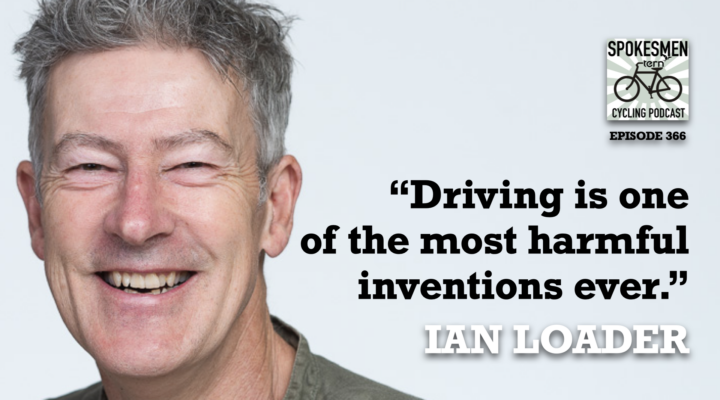
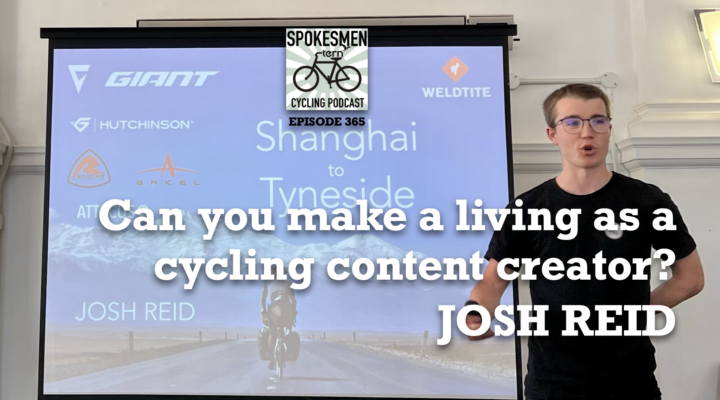
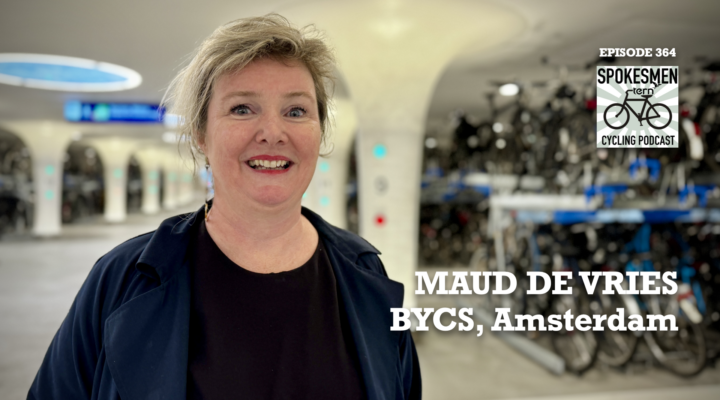
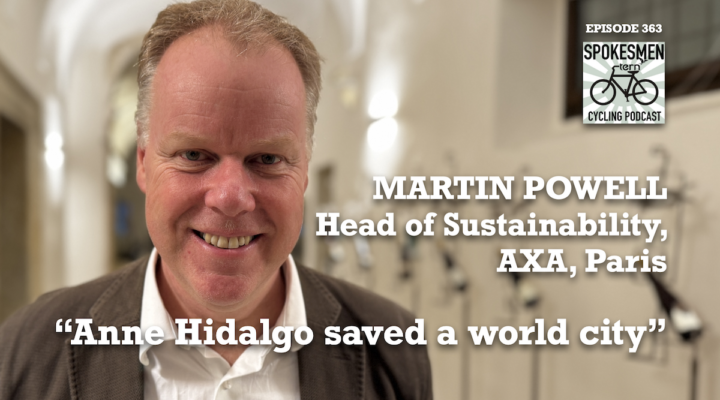
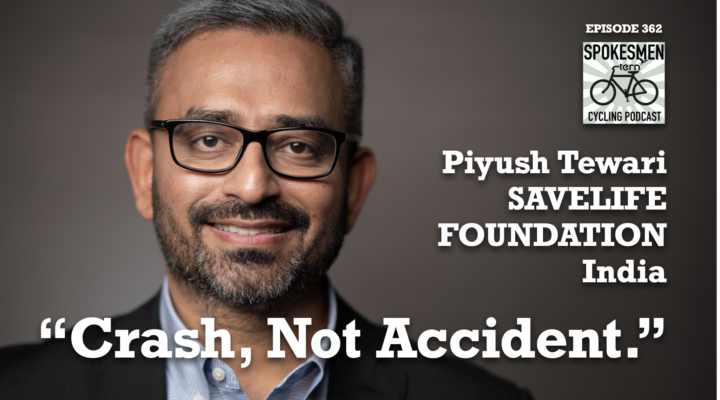
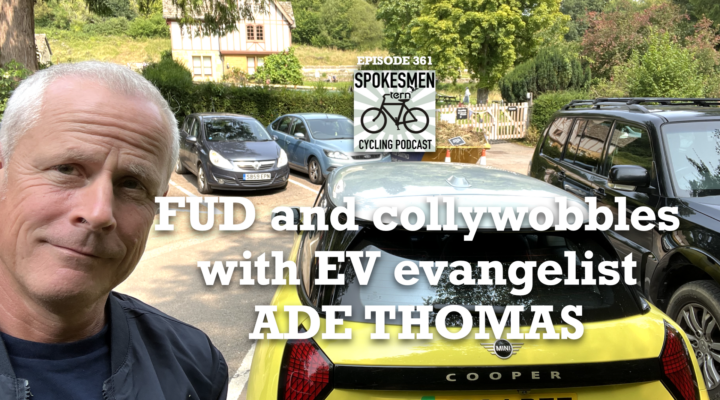
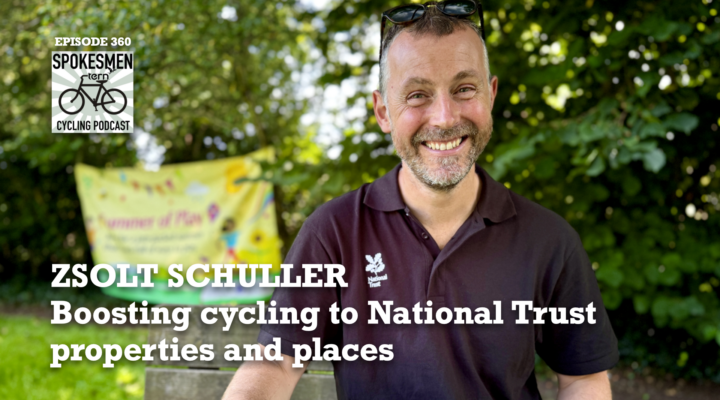
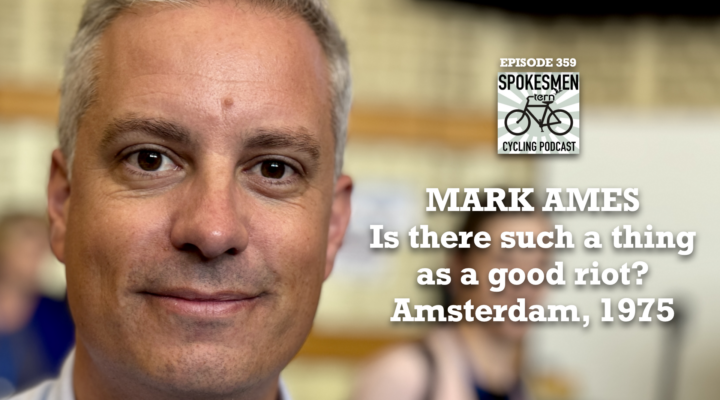
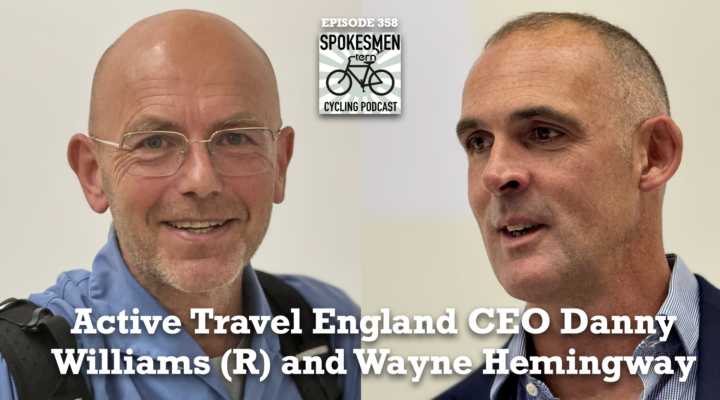
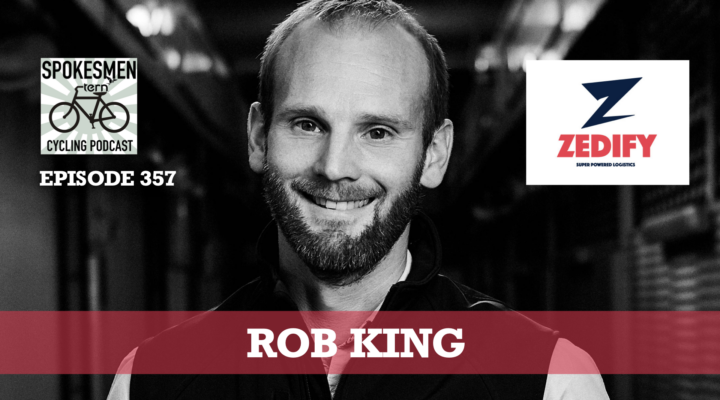
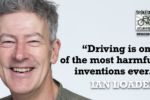
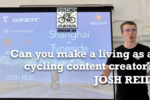
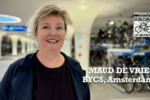
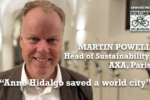
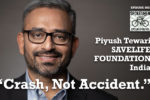
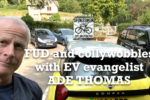
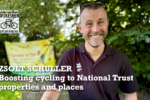
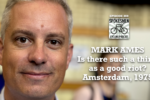
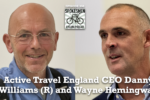
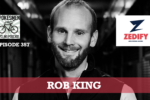
Be First to Comment